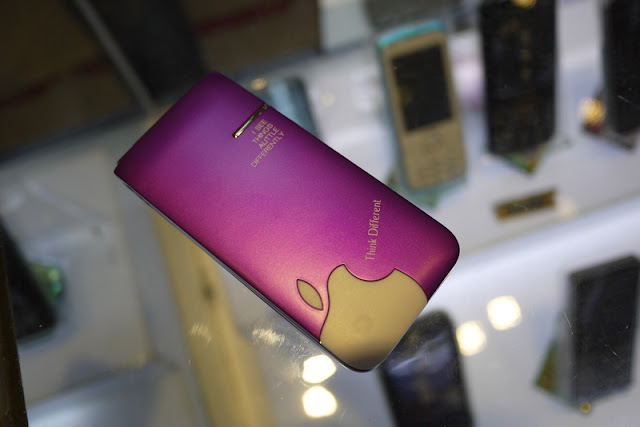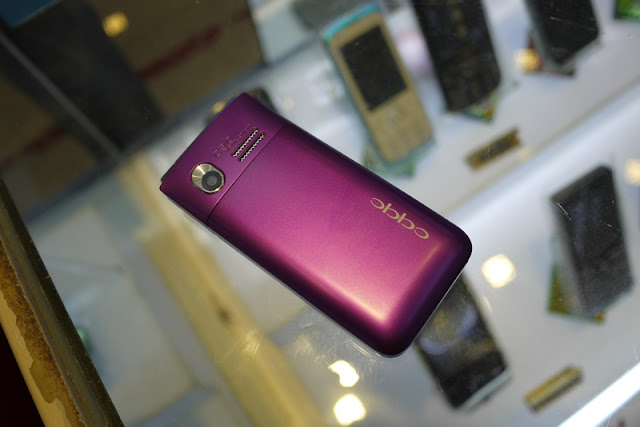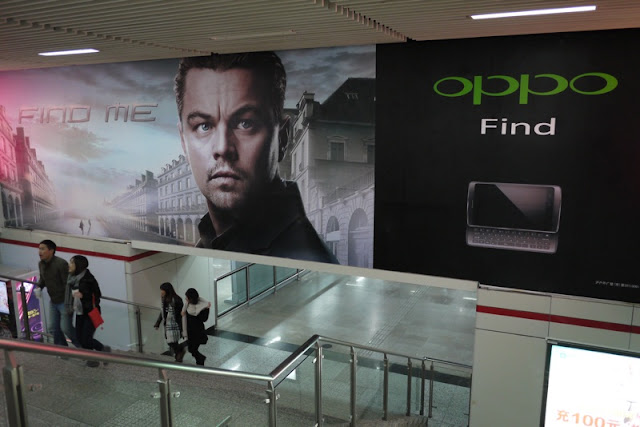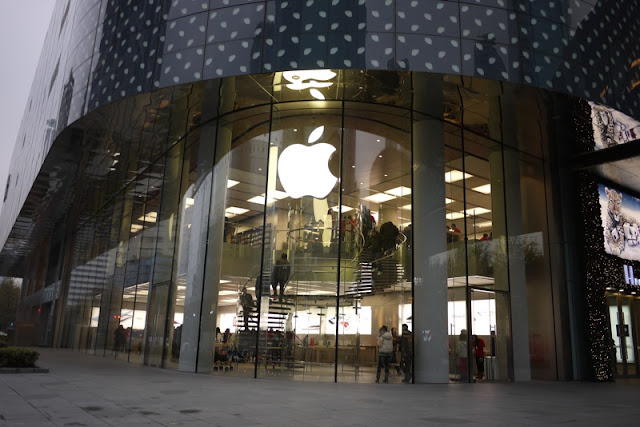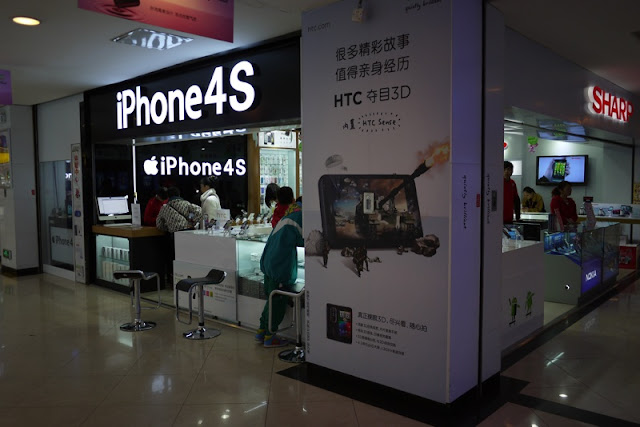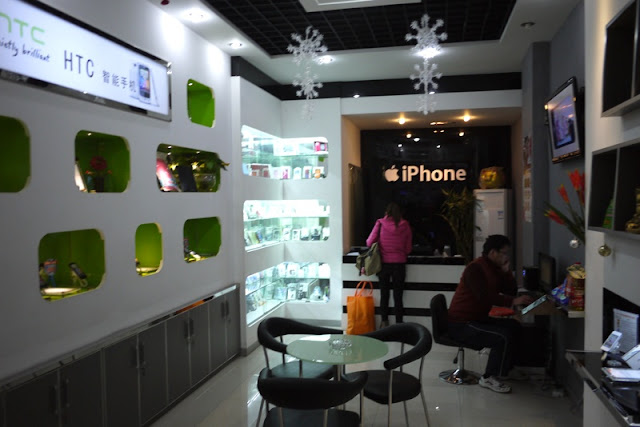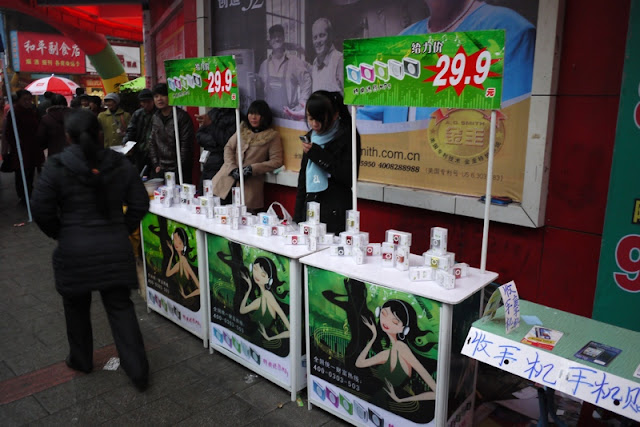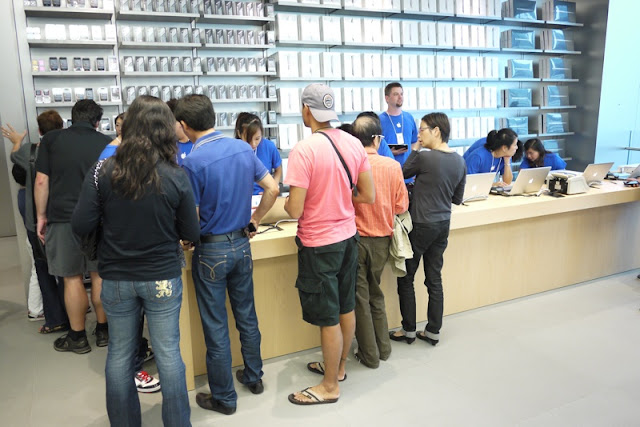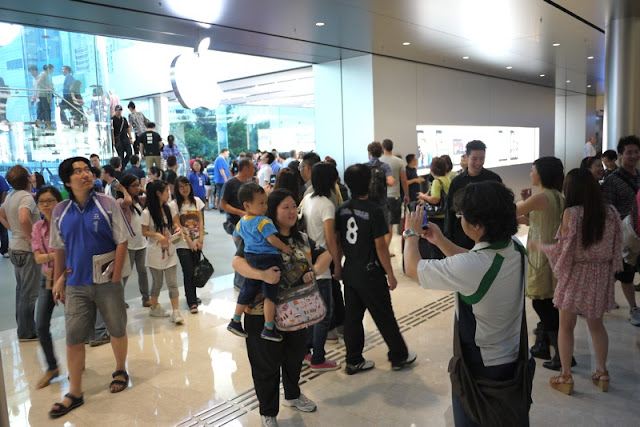As I've mentioned before using Oppo as an example, some Chinese companies are attempting to establish distinct brands of mobiles phones that can directly compete in China with well-known global brands. Regardless, there still remain a large number of mobile phones available made by manufacturers who seem content to leverage the brand power of other companies. Phones with names such as Nckla (Nokia), iPheon (iPhone), Mctcrcla (Motorola), etc. are not hard to find (see here and here for some examples). I'll share a favorite of mine that serves as a striking example and illustrates some important points -- including how such phones could be useful to the companies of the brands they imitate.
Here is the front side of the flip-phone when closed:
The use of Apple's old advertising slogan "Think Different" and a large section of what appears to be Apple's logo present some potential trademark-infringement issues. I've seen other mobile phones with what are at the very least Apple-ish logos, so this came as no great surprise (see here for a related challenge Apple faces in China). However, it sports an overall unique design, and the phrase "I SEE THINGS ALITTLE DIFFERENTLY" [sic] captures a common theme I've encountered while speaking with youth in China: the desire to be different, but not too different (this is not unique to China, but there are nuanced differences from other countries).
With the Apple-like branding on the front, the other side of the phone provides a bit of a surprise:
The logo on it could be described as the Oppo logo with a few modifications. For reference, Oppo's logo can be seen in the advertisement I shared in my earlier post about Oppo's "Find Me" marketing campaign:
The modified Oppo logo is important for two reasons. One, it's representative of the challenges in China that fakes and imitations pose for Chinese companies. It's not just a problem for foreign companies. Two, it suggests that Oppo has reached a perceived level of success, whether in its brand recognition or in the quality of its logo, that has motivated others to "borrow" from it. As they say, imitation is flattery.
The inside of the phone also makes use of the variation on the Oppo logo:
Additionally, it's worth noting the dedicated button for QQ -- a popular service in China for social networking ,instant messaging, games, etc . -- and the fake diamonds in the key pad. Whether such design choices reflect a keen understanding of a segment of mobile phone consumers is a question well worth answering. For example, there are other indications that a little (or a lot of) "bling" on a phone is desired by many in China (a topic for a later post).
Regardless of any imitations, it's valuable for those in the mobile phone industry to consider the ways in which a product such as this one differs from their own. The phones are openly available, sometimes produced in a very quick cycle, and can be innovative in their own ways. They won't necessarily provide all of the answers and serve as just one piece of the research that should be conducted, but some insights may be discovered that will assist in delivering products that better meet the needs or desires of consumers in China (and potentially elsewhere as well). While companies such as Apple and Oppo may be frustrated by fakes and imitations, simply taking a close look at such phones may suggest opportunities for them, in their own way, to return the flattery.
Here is the front side of the flip-phone when closed:
The use of Apple's old advertising slogan "Think Different" and a large section of what appears to be Apple's logo present some potential trademark-infringement issues. I've seen other mobile phones with what are at the very least Apple-ish logos, so this came as no great surprise (see here for a related challenge Apple faces in China). However, it sports an overall unique design, and the phrase "I SEE THINGS ALITTLE DIFFERENTLY" [sic] captures a common theme I've encountered while speaking with youth in China: the desire to be different, but not too different (this is not unique to China, but there are nuanced differences from other countries).
With the Apple-like branding on the front, the other side of the phone provides a bit of a surprise:
The logo on it could be described as the Oppo logo with a few modifications. For reference, Oppo's logo can be seen in the advertisement I shared in my earlier post about Oppo's "Find Me" marketing campaign:
The modified Oppo logo is important for two reasons. One, it's representative of the challenges in China that fakes and imitations pose for Chinese companies. It's not just a problem for foreign companies. Two, it suggests that Oppo has reached a perceived level of success, whether in its brand recognition or in the quality of its logo, that has motivated others to "borrow" from it. As they say, imitation is flattery.
The inside of the phone also makes use of the variation on the Oppo logo:
Additionally, it's worth noting the dedicated button for QQ -- a popular service in China for social networking ,instant messaging, games, etc . -- and the fake diamonds in the key pad. Whether such design choices reflect a keen understanding of a segment of mobile phone consumers is a question well worth answering. For example, there are other indications that a little (or a lot of) "bling" on a phone is desired by many in China (a topic for a later post).
Regardless of any imitations, it's valuable for those in the mobile phone industry to consider the ways in which a product such as this one differs from their own. The phones are openly available, sometimes produced in a very quick cycle, and can be innovative in their own ways. They won't necessarily provide all of the answers and serve as just one piece of the research that should be conducted, but some insights may be discovered that will assist in delivering products that better meet the needs or desires of consumers in China (and potentially elsewhere as well). While companies such as Apple and Oppo may be frustrated by fakes and imitations, simply taking a close look at such phones may suggest opportunities for them, in their own way, to return the flattery.

